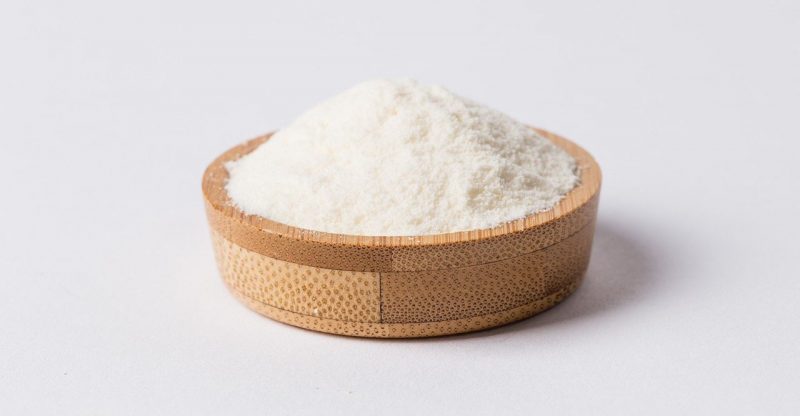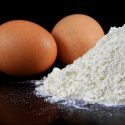What is Tricalcium Phosphate E341(iii) in Food: Uses, Safety, Side Effects

What is it | Uses | Safety | Side Effects| FAQs
Tricalcium phosphate (abbreviation TCP) is a tricalcium salt of phosphoric acid with the chemical formula Ca3(PO4)2. In food, it is used as an anticaking agent in powdered food and a nutritional supplement of calcium and phosphorus in infant formulae and cereals. The European food additive number for it is E341(iii).
What is Tricalcium Phosphate?
TCP is a subclass of calcium phosphates and makes up of a variable mixture of calcium phosphates and having the approximate composition of 10CaO·3P2O5 ·H2O. It can be used in vegan food and supplement for its mineral origin.
What is it Made From?
Food grade TCP can be produced by the reaction of phosphoric acid with calcium carbonate or calcium hydroxide (see following reaction equation) OR the reaction between calcium chloride solution and trisodium phosphate. (1)
6H3PO4+ 10CaCO3=10CaO·3P2O5·H2O + 10CO2
Properties
| Appearance | A white odourless powder. |
| Other names |
|
| CAS number | 7758-87-4 |
| Chemical formula | Ca5(PO4)3 ·OH or Ca3(PO4)2 |
| Molecular weight | 502 or 310 |
What are the Uses of TCP?
Tricalcium phosphate is an ingredient used in many applications. Its food grade is commonly used as an anticaking agent to make powdered food free-flowing, also as a nutritional supplement supplies both calcium and phosphorus minerals in fortified foods.
Meanwhile, it can be used as a whitening color to replace titanium dioxide. Other applications like in baby powder, toothpaste, and pharmaceuticals.
Food
Anticaking agent
Tricalcium phosphate is used to prevent powdered food from caking, lumping, or aggregation and improve the fluidity. We can commonly find it in powdered drink, powdered milk, non dairy creamer, instant powders, table salt, spices and etc.
Nutritional supplement
Tricalcium phosphate is a source of calcium and phosphorus. Its main function in food fortification is to increase the calcium supplement due to its higher calcium content.
The applications such as in cereals, dairy products (e.g. yogurt), juices, multivitamins and pharmaceuticals. Its calcium content is higher than that of monocalcium phosphate, which is used as a leavening acid in baking powder.
Our absorption of calcium would be more efficient when combined with vitamin D. Calcium carbonate and calcium citrate are two common calcium supplements.
Feed
TCP can also be a dietary supplement of calcium and phosphorus in pet food, e.g. in cat and dog food. It benefits cat and dog in building bones, nerve impulse transmission and other benefits.
Cosmetics
Per “European Commission database for information on cosmetic substances and ingredients”, it functions as an abrasive, anticaking, masking, opacifying amd oral care agent in cosmetic and personal care products. (2)
Toothpaste
Calcium and fluoride will join together to form calcium fluoride in toothpaste, which makes the fluoride less effective in preventing tooth decay.
Functionalized tricalcium phosphate produced by beta-tricalcium phosphate and sodium lauryl sulfate can prevent this reaction during the storage of toothpaste and thus generate more fluoride and calcium ions to remineralize enamel and protect the dental from caries. (3)
Is Tricalcium Phosphate Safe to eat?
Yes, its safety when used as a food additive has been approved by the U.S. Food and Drug Administration (FDA), European Food Safety Authority (EFSA), Joint FAO/WHO Expert Committee on Food Additives (JECFA), as well as other authorities.
FDA
Calcium phosphate (mono-, di-, and tribasic) is generally recognized as safe (GRAS) when used in accordance with good manufacturing practice. (4)
EFSA
Tricalcium phosphate E341(iii) is listed in Commission Regulation (EU) No 231/2012 as an authorised food additive and categorized as “additives other than colours and sweeteners” (5)
Safety Re-evaluation in 2019
In 2019, EFSA considered phosphates (including tricalcium phosphate) low acute oral toxicity and no links with genotoxicity, carcinogenicity and developmental toxicity after several studies. EFSA derived a group acceptable daily intake (ADI) for phosphates expressed as phosphorus of 40 mg/kg body weight (bw) per day. (6)
Authorised Uses And Use Levels
Some of its application is listed in E 341 except the uses in nutrients for Infant and young children. The following foods may contain with it (7):
- Processed cereal based foods and baby foods for infants and young children
- Infant formulae
- Table-top sweeteners in powder form
- Fruit-based desserts
Also, it can be used as a carrier in all food additives with the “quantum satis” and in the preparations of colours and emulsifiers.
UK Food Standards Agency
Categorized in “Others” (8)
Food Standards Australia New Zealand
Calcium phosphate (mono-, di-, and tribasic) in Australia and New Zealand are all with the code number 341. (9)
JECFA
Functional Class: food additives, acidity regulator, anticaking agent. (10)
Tolerable Intake: MTDI 70 mg/kg bw (as P) set in 1982. (11)
What are the Possible Side Effects of TCP?
It is common that consumers have concerns on whether tricalcium phosphate is bad for our health and what are the possible health risks. It is generally considered safe but some people may be allergic to it and the large consumption may lead to some side effects like kidney disease and hypercalcemia.
Is it Safe for Pregnant?
Yes, it is generally safe but better consult with your doctor in the condition of use.
Frequently asked questions
Is Food Grade TCP Natural?
No, it does not occur naturally and made from chemical synthesis.
Is TCP Vegan?
Yes, it is vegan as the raw materials phosphoric acid, calcium hydroxide (or calcium carbonate), calcium chloride and trisodium phosphate are all from mineral sources instead of animal-derived. So it is vegan and suitable for the diet of vegetarians.
Tricalcium phosphate can also be found in milk, skeletons and teeth of animals, but these sources are not used in food.
Is TCP Dairy Free?
Yes, it is dairy free as the calcium comes from limestone instead of animal sources. So people who’re lactose intolerance or with milk allergy can eat the food with it.
Is TCP Halal?
Yes, it is generally recognised as halal as it is permitted under the Islamic Law and fulfill the conditions of Halal. And we can find some manufacturers certificated with MUI halal.
Is TCP Kosher?
Yes, it is kosher pareve. E341(iii) has met all the “kashruth” requirements and can be certified as kosher.
Is TCP Gluten Free?
Yes, it is typically gluten-free and people with celiacs can eat it. It is an ingredient commonly found in both gluten-free and gluten-containing food labels. The manufacturing process complies with the FDA’s definition of gluten free, that it does not contain wheat, rye, barley, or crossbreeds of these grains.
Is TCP A Salt Additive?
Yes, it can be used as an anticaking agent in salt like silicon dioxide and calcium silicate.
Is TCP A Preservative?
No.
Is TCP Same As Talc?
Obviously they’re different but both are anticaking agents. Talc is a naturally occurring form of hydrous magnesium silicate with the European food additive number E553b.
Tricalcium Phosphate Vs Calcium Citrate Vs Calcium Carbonate?
They’re all the supplement of calcium. Calcium citrate and calcium carbonate are the two common forms of calcium.
From the point of calcium amount: TCP has about 39% calcium by weight, calcium carbonate has the highest amount – with 40% calcium and calcium citrate only with 21% calcium.
Absorption: calcium carbonate needs to be absorbed by stomach acid, better taken with food while calcium citrate is easier to absorb than calcium carbonate and we can eat it with or without food (12). TCP is also easy to be absorbed and can be used in food with a high calcium content desired.
Tricalcium Phosphate Vs Trisodium Phosphate?
Both belong to phosphates but with the different categories of food additive. TSP is most used as an acidity regulator while TCP is as an anticaking agent.
Conclusion
Now you may have a good knowledge of the food additive – Tricalcium phosphate E341(iii), from its production; uses as an anticaking agent and supplement; approved safety, possible side effects and some FAQs such as is it vegan, gluten free, synthetic or natural.
What kinds of food packaging have you found this ingredient in? Let me know in the comments.



How much tricalcium phosphate do you use for dry spices, like an 80z bottle or for 50 pounds.
Hi Cindy,
Where are you from? If in Europe, as far as I know, tricalcium phosphate cannot be used in dry spices. For more information, you can see (12
Salts, spices, soups, sauces, salads and protein products)in the url of https://eur-lex.europa.eu/eli/reg/2008/1333/2019-10-23
Hi
Myself from India,
How much quantity of TCP can be used in ice cream mix powders.
Hi
This information is great, I’ve started to see it pop up in a lot of vegan dairy alternatives….however it gives both me and my little boy a bad stomach. Once cereal only had 3 ingredients so it has to be this item 😭😭. Is it common to have a side effect ? Your information makes it sounds rare.
I have had allergic reactions to TCP. After about 30 mins of ingesting it I get itchings inward with strong coughing.
It has been in spices,poultry seasoning Badia. Scary🙅
How much tricalcium phosphate do you use for dry spices or food powders is there a ratio scale that can be referred to? I’m not from Europe. I’m from the U.S.A.
Hi, thanks for the article. I purchased Popadelics crunchy mushroom chips in a trendy GA, USA store. I was under the impression by listed ingredients that it was mostly healthy. However, On the package this ingredient was not disclosed, but when I scanned the product in the Yuka app once consumed ugh, 2 negative ingredients were advised to be avoided and E34iii Tricalcium Phosphate was listed as the 1 hazardous ingredient. I am assuming it was disguised under the listing of Natural Flavors. 🙁